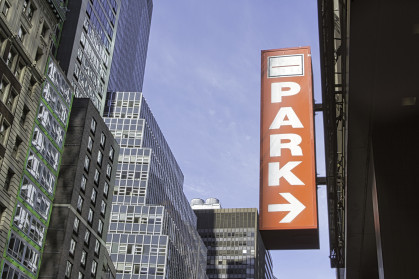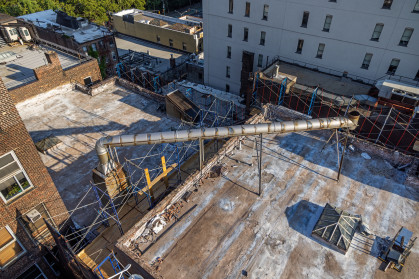Fireproofing: 3 ways to protect your building from the financial costs of a fire
- Make sure your bylaws are up to date so your building is protected
- Vendors, like contractors and subcontractors, must have insurance

It’s extremely important for your board to be proactive when it comes to repairs.
iStock
When a fire strikes a New York City condo or co-op building, a board has to act fast to protect its residents and manage repairs. But it’s what a board does before a fire that will determine if they can meet the cost of those repairs in the aftermath of a blaze.
“It all comes down to making sure your bylaws clearly define the responsible party, or parties, for damage to elements of the building,” said Christopher M. Tarnok, a real estate attorney at DL Partners, which represents condo and co-op buildings throughout NYC. “If your bylaws are silent, your building could be in a tough spot.”
If a resident caused the fire, your building’s bylaws will determine whether your board can force that resident to pay for repairs, or even cover the subsequent increase on your building’s insurance premium. But your board doesn’t only need strong bylaws—you also need a skilled legal team to enforce them.
“If you’re not attentive and on top of things, your bylaws are useless,” said Jonharold A. Cicero, an attorney at DL Partners. “You have to reach out to counsel when your board has a problem. Then, we will advise you on what the parameters are of your bylaws so you can take action.”
Read on for what steps your board should take before a fire to protect the building, and what you need to do in the aftermath.
Make sure your building’s bylaws protect the property
It’s essential to review your building’s bylaws to make sure they address who is responsible for repairs after a fire—particularly if you’re on the board of an older building. You want to make sure your bylaws “adequately discuss the responsibilities and obligations of the board versus the unit owners or shareholders,” Cicero said.
The maintenance and repair section should clearly state that a resident is responsible for repairs when it’s their negligence, or omissions, that cause a fire, Tarnok said. But you don’t want to lay out events when a resident will be responsible for damages arising from their negligent acts or omissions, Cicero added.
“You don’t want it to be too specific,” Cicero said. “If you forgot something, the other side will argue that because you accounted for everything else, you would have accounted for this situation if you wanted it to be considered, but chose not to include it. You want to cast a large net.”
Your building’s bylaws could also include the expectation that a unit owner will pay for the increased premium for the building’s insurance policy after a blaze. If you live in an older building, it’s unlikely your bylaws contain this type of provision, so you might want to update them.
Everyone in your building needs insurance
“Your building, contractor, unit owners, or shareholders, all need to have insurance,” Tarnok said. “You must have coverage, especially when work is being performed.”
Your building probably already has its own insurance policy, and requires residents to get one as well. But your board also has to enforce the rules and require that the building’s vendors—especially contractors and any subcontractors—are covered. If a contractor’s negligence causes a fire, it’s their policy that should pay up, not your building’s coverage.
“The moment you use insurance, it gets more expensive,” Tarnok said. “So if someone else committed a negligent act that led to the damage, you want that person’s insurance policy to cover it so you can avoid increased premiums or a drop in coverage from the carrier.”
When a fire strikes, don’t wait to call your lawyer
The worst thing your board can do is delay after disaster hits. Not informing your lawyers about an accident, or a resident that won’t pay for repairs, will only increase your building’s problems (and your attorney’s fees).
“It’s extremely important to have a proactive board,” Cicero said. “That means telling us, as your attorneys, about an accident or fire right away.”
You should also keep in touch with your attorneys after a fire. If a resident is found to be at fault for the damage, they would usually pay through a special assessment. If they don’t pay, it can create all kinds of problems for themselves and your building.
“It can become a serious issue quickly,” Tarnok said. “If the board is not doing anything about it and allows it to linger, it just gets more complicated. The issues grow, the arrears increase, and it becomes a whole different animal.”
A letter from an attorney will often get a resident to pay up, so it’s best to contact your lawyers right away to resolve problems quickly. As Cicero puts it: “You’ve retained us, as your attorneys, to help you with these situations. Tell us when there are ongoing problems.”
New York City real estate attorneys Jonharold A. Cicero and Christopher M. Tarnok are partners at the real estate law firm DL Partners, offering innovative legal services to co-op and condo boards, developers, condominium sponsors, architects, contractors, property owners and brokers. For a complimentary 15-minute consultation on a real estate matter, send an email to Christopher or call (212) 624-4185.
Sign Up for our Boards & Buildings Newsletter (Coming Soon!)
Thank you for your interest in our newsletter. You have been successfully added to our mailing list and will receive it when it becomes available.






















